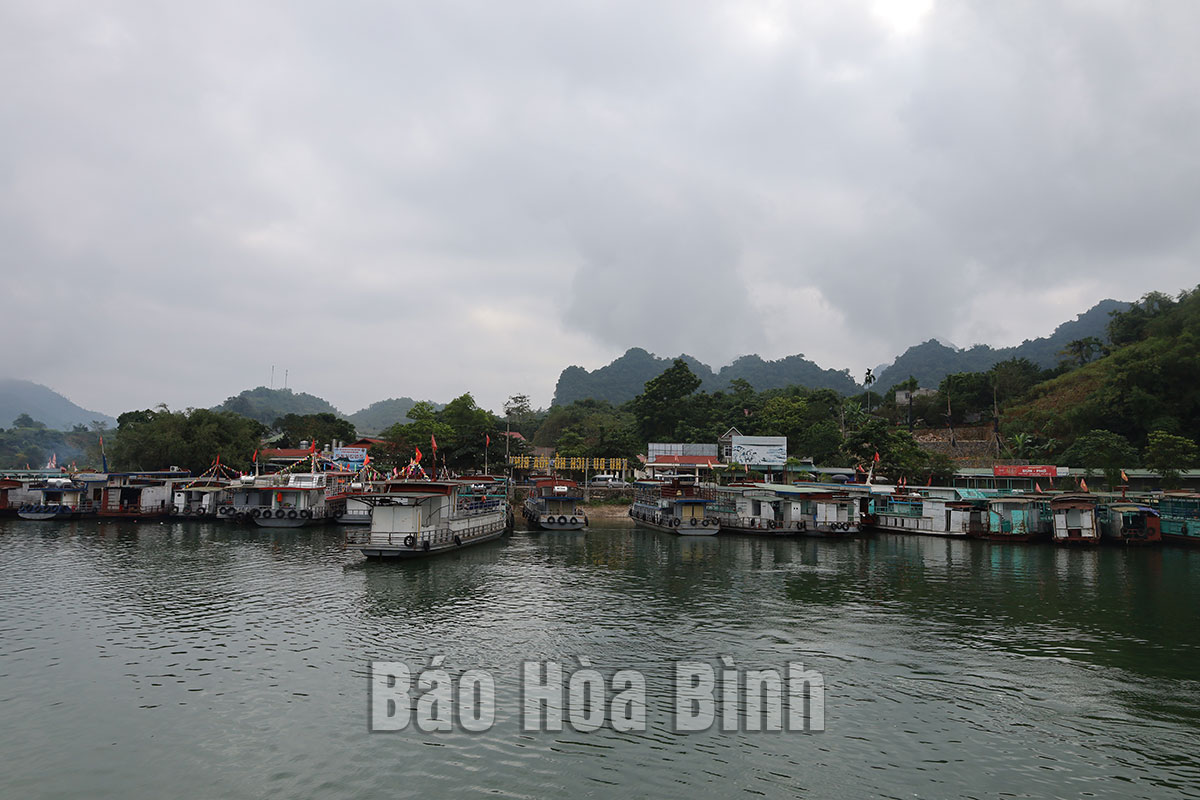
(HBO) – Thung Nai in Hoa Binh’s Cao Phong district used to be a disadvantaged commune but it has made strides in tourism development and become more popular thanks to captalising on its location of being in the reservoir area.

Thung Nai wharf in Thung Nai commune (Cao Phong district) – the starting
point of a trip to explore Hoa Binh reservoir.
Thanks to a close proximity to the capital city of Hanoi, visitors can travel
to the Thung Nai tourism site by various means of transport, including
motorbikes, coaches or self-driving cars.
The road linking Hoa Binh city with Thung Nai wharf has been upgraded with
qualified infrastructure, creating optimal conditions for visitors to explore
each location of the tourist site by boat.
Head of the Cao Phong district’s culture-information office Pham Ngoc Nhat said
that the Thung Nai tourist site is located on a favourable area in the Hoa Binh
reservoir and home to numerous spots like Thac Bo temple, Trach stream and Thac
Bo float market.
It is also close to a community-based tourism site in Suoi Hoa commune (Tan Lac
district). In addition, tourists are advised to visit nearby Thac Bo temple
with marvelous and mystical beauty.
Another outstanding location in the Thung Nai trip is Trach stream. It is
compared to a natural fascinating pool with cool fresh water flowing through
the rocks. To reach the stream from Thung Nai wharf, visitors travel for about
20 minutes by boat and then walk for some 1 km from Da River’s bank until they
can hear the sound of the stream.
If coming to Thung Nai on Sunday, travellers will have a chance to explore Thac
Bo float market. Trading activities is bustling here, with the most-traded
items being Hoa Binh reservoir’s specialties of fish, shrimp, and dried bamboo
shoots. Many chose to book their trip on weekends to leisurely select products
at the floating market.
In addition to locations for sight-seeing, Thung Nai is suitable for camping
and team building activities.
Visitors should try canoeing to enjoy the feeling of floating on water surface.
They also are impressed by delicious dishes, fresh food and overnight stay at
inns on the reservoir.
Two highly-rated inns are Coi xay gio (The Windmill) and Dao Dua (Coconut
Island). The first one is built based on European style with reasonable costs
and nice view and is suitable for couples and families going on vacation.
Meanwhile, Dao Dua inn has an eco-friendly vibe, offering various services for
families and groups of friends who favour activities and exploration./.
Located just a 20-minute drive from Hoa Binh City, Ora Hill Farmstay & Glamping Hoa Binh is a captivating new destination nestled in Mo hamlet, Bình Thanh commune, Cao Phong district. Combining farming with leisure, this tranquil retreat is perfect for those seeking balance, joy, and an immersive experience in the expansive beauty of nature.
Muong Bi - Tan Lac is renowned as one of the four famous Muong regions in Hoa Binh province. Blessed by nature with a favourable climate and stunning landscapes, Tan Lac holds great advantages for tourism development. The local tourism industry has made remarkable strides in recent times thanks to the attention and support from the local authorities and sectors.
With its strategic location, well-developed transport network, and diverse soil and climatic conditions, Hoa Binh is emerging as a must-visit destination in Vietnam's northwestern tourism corridor. The province boasts numerous attractions, including the Kim Boi hot springs (Kim Boi district), the Dau Rong cave complex (Cao Phong), the Mai Chau valley (Mai Chau), and the iconic Hoa Binh hydropower plant.
The northern mountainous province of Hoa Binh has been listed among the 71 most beautiful places to visit worldwide by the prestigious US travel magazine Condé Nast Traveller.
Hoa Binh province’s rich natural and cultural resources position it as a prime location for developing community-based tourism (CBT). In recent years, support from central and provincial policies, as well as assistance from non-governmental organisations, have encouraged local ethnic minority and mountainous communities to actively engage in the sector.



